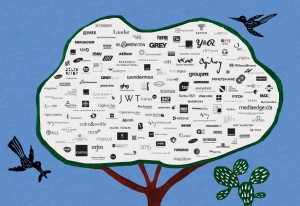 I’m slowly coming to the firm conclusion that marketing services (and all that it comprises) should have acquired advertising – and not the other way around which is what seems to have happened in the industry. Marketing Services (despite their appalling name) agencies had one of the most interesting remits of the late 90s and early 2000: Everything from direct and CRM to activation and promotion and then adding the interactive arm, made these agencies a hotbed of strategic knowledge as they took their understanding of marketing and communication and overlaid the growing digital skillset (not quite what happened in advertising).
I’m slowly coming to the firm conclusion that marketing services (and all that it comprises) should have acquired advertising – and not the other way around which is what seems to have happened in the industry. Marketing Services (despite their appalling name) agencies had one of the most interesting remits of the late 90s and early 2000: Everything from direct and CRM to activation and promotion and then adding the interactive arm, made these agencies a hotbed of strategic knowledge as they took their understanding of marketing and communication and overlaid the growing digital skillset (not quite what happened in advertising).
So how are these agencies, and their people, different?
Business approach – Starting with a real understanding of the client business is a major plus when it comes to creating solutions. Who the customers are, what the purchase process and product lifecyle looks like; and all this before looking at the product itself, maybe even before creating the product, to create real USPs rather than trying to polish up existing features to differentiate in highly commoditised markets. Research is much more than a simple focus group with a storyboard but can go into great depth in qual and quant to build up personas and drag out insights that we never even knew existed.
Skillset – The people in these business are more T-shaped. They have an understanding of what it is they do and also a breadth of knowledge about how it fits into the larger landscape, this means that when creating a solution to a business challenge there isn’t a one-size fits all advertising message. These people also know how to adapt a solution both for the time and budget that is available, something agencies are notoriously bad at doing with their ideas.
Channel knowledge – Beyond T-shaped, an understanding of the ever-growing number of channels available to brands to engage with their prospects and consumers, added to this the digital knowledge means a strategic implementation of digital as a tool rather than simply an additional medium alongside TV and print.
Reactivity & process – working with activation and promotion has also taught the business about lead times, when communication is time sensitive and cannot afford creative principle and when a message needs to build brand over and above other objectives and should be polished to perfection.
Strategy vs creative – But potentially the most important difference is the understanding of the roles that both strategy and creative play in the communications process; the importance of defining a message, a medium and the right moment before getting caught up with creative; and how clearly important a strong strategy is to keep everything on track and pointing in the right direction.
So why did it happen this way… money.
This happened because regardless of any strategic direction, the ruling criteria is always money – and the fact is that the billings and margins of ad agencies (in their traditional form) are still much greater than anything else, this may well also be connected to the media spends associated with these traditional media, since we know that the proliferation of technology means that anyone can more or less whip-up an award winning TV commercial in their garage (sorry ad guys). If we could only take the learnings above and apply them to advertising, or a new type of professional marketing services firm then maybe we could acheive nirvana.
So, what firms are doing this, and how?
There are all the new age ad models that I love to research and talk about, see @AgencyFuture to get an in depth look at some examples. But beyond the ad shops, the new ad models, there are other firms that have potentially approached this business from a completely different angle, working with more of a zero-base approach to try and find the right solution. One of these is Rosetta – I came across them a few years ago as they were the research partner for a major international banking client that I was working on, they had developed some very deep new behavioural models that they were rolling out on financial services products which gave not only great deal about the target group in terms of location and potential, but also what they wanted to hear, in what format and sometimes down to the individual medium. Since then, Rosetta have expanded their mandate to include execution (primarily from a digital angle) and have recently acquired Level Studios (a production house) to increase their internal skillset further.
So here is an agency that began in the research and consulting world, and has now developed a global proposition that includes creative and development – this is definitely an interesting model for the future… watch this space.


2 comments